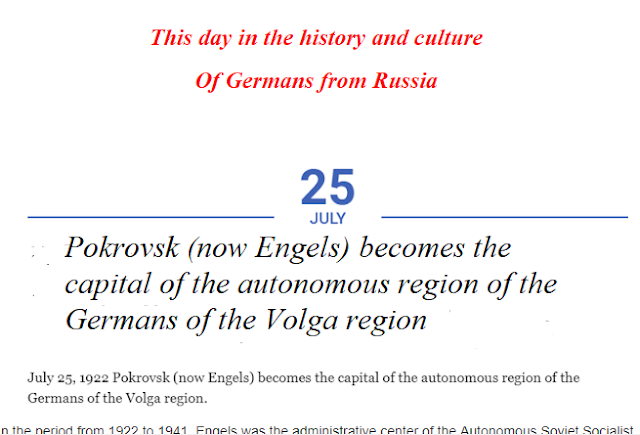In the period from 1922 to 1941, Engels was the administrative center of the Autonomous Soviet Socialist Republic of the Germans of the Volga region. The pre-war decade was a time of rapid industrial growth. In the late 1930s, one of the country's largest meat-packing plants was built. On the basis of the railway workshops, the Pokrovskaya Mechanical Plant was established, which mastered the production of snowplows and snow-removing trains. In 1934, the first machine-building plant was produced. In these years, a glutinous plant, a bakery, a printing plant were built. Before the Great Patriotic War in Engels, there were 73,300 inhabitants, of whom 6,000 worked in urban industrial enterprises.
The city of Engels became the third after the Saratov and Marx  Germans of the Volga region. Marx and the last capital of the ASSR of the Volga Germans.
Germans of the Volga region. Marx and the last capital of the ASSR of the Volga Germans.
 Germans of the Volga region. Marx and the last capital of the ASSR of the Volga Germans.
Germans of the Volga region. Marx and the last capital of the ASSR of the Volga Germans.Pokrovsk. CEC and the Council of People's Commissars of the Autonomous Soviet Socialist Republic of the Germans of the Volga region
(Circa 1927)
The city of Engels became the third after the Saratov and Marx  Germans of the Volga region. Marx and the last capital of the ASSR of the Volga Germans.
Germans of the Volga region. Marx and the last capital of the ASSR of the Volga Germans.
 Germans of the Volga region. Marx and the last capital of the ASSR of the Volga Germans.
Germans of the Volga region. Marx and the last capital of the ASSR of the Volga Germans.
Metropolitan status Pokrovsk, so it was then called, was received almost instantly. June 22, 1922 Pokrovsk together with Pokrovsky uyezd was transferred from the Saratov region to the AO of the Germans of the Volga region, and on July 24, 1922, the capital of the German autonomy moved here. I can assume that the move was carried out for two main reasons. First, the German autonomy obeyed the regional authorities, which sat in the city of Saratov, and from Saratov to Engels - a stone's throw. Secondly, there were still no railway in Marx, the country's leaders liked to come with visits by rail. Pokrovsk was visited by Kalinin and Rykov, serious figures of the political beau monde of that time. In 1935 a railway bridge was built, connecting Saratov and Engels.
Former building of the Lutheran church
The Pokrovskaya Sloboda was founded by the Little Russian Chumaks, which carried salt from Lake Elton, and was never part of the German colonies. The number of Lutherans and Catholics is small. According to the 1897 census, the main part of the population of the settlement (21,018 people) in the city was Orthodox, then Lutherans - 809, Catholics - 407, Mohammedans - 52 and Jews - 26 people. There was neither a Lutheran church nor a Catholic church. only two prayer houses: Roman Catholic and Evangelical-Lutheran. The prayer houses were located in ordinary wooden huts. And only in 1891 was bought a three-story stone house from VA. Lebedinskaya, which was rebuilt according to the project of architect A.M. Salkov in the Lutheran prayer house with a kysterat (church-parochial school) and a belfry. In 1930, the room was given to a music school and school, closed in 1941.
To give more Germanity, it was decided to rename the city of Pokrovsk. Unlike Chagin in the city of Marx, the name of the person who proposed to do this is unknown. October 18, 1931 renaming in the city of Engels occurred, as previously wrote "at the request of the city residents." The decision was taken by the Presidium of the Central Executive Committee of the USSR, but he had no particularly great choice, because in the petition of the republic itself there were two more options: "Rosa Luxemburg" and "Leninstadt". So two friend-German revolutionaries met in the German autonomy on the banks of the Volga.
The status of the capital obliged to much. The development of industry, education, and culture began.
In 1931 it was decided to build a meat-packing plant and in 1936 its first stage was introduced. During the war, even penicillin was produced here, in addition to the main products. But in the battles with modern market relations the meat-packing plant could not stand it.
Meat processing plant in the past and this century.
Sources:
https://ok.ru/g.engelspokrovsk/topics
http://forum.wolgadeutsche.net/viewtopic.php?p=158257
https://yandex.ru
http://oldsaratov.ru/photo/gubernia/21885?/
rusdeutsch.ru
http://geschichte.rusdeutsch.ru







Comments
Post a Comment